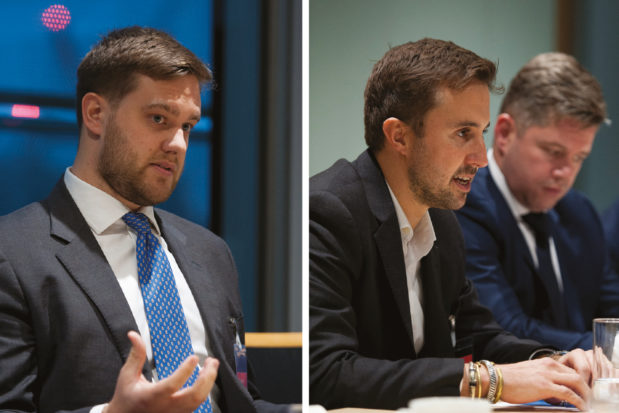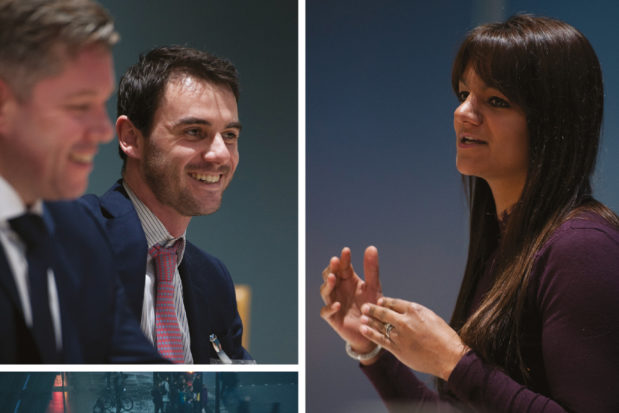
Winners, runners-up and finalists of the GTR BExA Young Exporter of the Year award past and present were invited to discuss their biggest exporting achievements, what – if any – concerns they have about Brexit, and what the UK can do to drive its future as an exporting hub.
Roundtable participants:
- Nick de Lisle, bid manager, NMS Infrastructure
- Geoff de Mowbray, CEO, Dints International and BExA co-chairman (chair)
- Jack Holmes, vice-president business development, Winch Energy
- Ashlie Hubbard, customer service executive, Ramsden International
- Christian McBride, chief executive, Genuine Solutions Group
- Stephen Mellor, key accounts lead, HiETA Technologies Ltd
- Freddie Tucker, trade and structured finance director, Dints International
De Mowbray: As young exporters, what has been your single personal greatest export achievement to date?
Holmes: My greatest export achievement was two years ago when we created Winch in its current iteration. My colleagues and I at that time had come from the traditional on-grid solar world, and as we looked at developing projects in Africa we quickly realised that typically only 20% of the population of each country we looked at had access to electricity. This equates to circa 750 million people across Africa who are without power and spend up to US$16bn a year on traditional energy products, such as candles, batteries, etc. After searching for a technical solution on the market, we decided to create our own product which we call the Remote Power Unit, which is containerised solar PV battery solution that can provide 24/7 power via a mini-grid to rural communities. Upon building our first unit we conducted a funding round and raised US$10mn, which has allowed us to develop a number of projects across Africa. Currently we are developing projects in Zambia, Benin, Mauritania and Sierra Leone. Our business model is to either sell power as an independent power producer or, utilising UK Export Finance (UKEF) funding, sell our technology to African governments and manage the units on behalf of the government. 2018 is hopefully going to be a big year for us; we have a strong pipeline.
Mellor: We are also quite a new company: we have grown pretty rapidly over the past five years. We started off with some IP in the area of 3D printing and we came up with some good ideas about how to make new products that were smaller and more efficient than some competing products. We used Innovate UK originally and some other funding to basically build the business.
We had a bit of customer pull, but the real challenge for us was to convince someone to buy this thing that we had developed. It took us four years.
The biggest achievement for me was when we were contacted by a tier one automotive company in Europe in January last year. We went out to them, and to see the R&D manager and engineering team looking at what we’d done and saying, ‘wow, we have to have that, that’s amazing’, was a great position to be in, and as an engineer it was great. Then we negotiated a contract, and although the value of the design contract wasn’t huge, I’m confident that it will turn into something bigger, and they will become a key account. We only need a few of those to fundamentally change the business. That was quite a proud moment.
De Mowbray: Because you don’t replicate things in 3D printing, you re-engineer them, is that a major challenge and therefore a major success in getting people to buy into that change of product?
Mellor: Yes. The big challenge is that engineers do not like change – apart from the guys in motorsport, who are happy to take the risk – but especially when you go into aero and automotive where people have been doing the same thing for many years. It’s a good job they are conservative, because it’s probably what keeps planes in the sky and cars from crashing. But it is a huge challenge to say, actually, that product is basically what it is because of the constraints that you have had in the past, let’s try and get back to the requirements. What did you want to do? Let’s engineer the part from scratch. Eventually we end up changing the culture, or changing the mindset at least. It is very satisfying.
Hubbard: My greatest achievement was last February, having been given the opportunity to attend Gulfood, the biggest trade show Ramsden International attends in the Middle East. During the trip, I had the opportunity to meet and greet a lot of our current customers; we brought on a lot of new customers. I also was able to travel with our territory manager to Oman, which is a market we had struggled to get into. A lot of our struggle was mainly getting the goods through customs.
I spent most of my week with the customer, clearing agent and customs, working together to identify a solution which would enable us to successfully clear the goods through customs resulting in no delays or extra charges. On my return to the UK I worked with the local council, chamber of commerce and British Airways to secure the right flight deals and service. Finally, four months later, we successfully completed our first order and now we have three very successful customers, which is forecast to bring us £2mn in sales this year.
De Mowbray: Is that a rarity, having to get into that level of detail?
Hubbard: Yes, that’s probably the most complex we have had so far. I think the international market is becoming an awful lot more complex, but in Oman it just felt as if the doors were really closed.
De Lisle: Our company signed a contract at the end of 2012 in Ghana to build six 120-bed district hospitals, and that was the first major contract they had won. It was a small company at that time, and contract paperwork was a real challenge. It was my job to come in and streamline that process, and in 2016 also take charge of the contract costings, as well as working on new potential projects. That was a massive learning curve for me, but really interesting.
The first contract I did was in Cameroon in 2015. That was €208mn for 5,300 houses. We then finalised one for US$300mn in April 2017 in Zambia for 108 health centres, and three 200-bed hospitals – this I am most proud of and had been working on since 2015.
De Mowbray: And with those three major projects, what would you say is the biggest common challenge between them?
De Lisle: Aligning costs with customers’ expectations, because they always ask for more. It is a give-and-take relationship. Obviously, it is their project, so as much as possible we bend over backwards to give them what they want, and to ensure that it’s sustainable, as there is no point delivering something that is not going to last on the ground.
McBride: Since founding Genuine Solutions 12 years ago, I have seen the business grow from humble beginnings to a business employing over 100 people and turning over about £25mn. It is still relatively small in the greater scheme of things, but there are a number of key achievements over those years, namely exporting to over 51 countries currently, which is a great thing for us as a business. We are touching base as far across as Brazil, Hong Kong, the Middle East and across Europe as well, which is very satisfying when we see our products in different areas.
Working with organisations such as the department for international trade (DIT) to support us with their boots on the ground and their capabilities to go out and leverage the market; that has really been a big thing for us. I think the most notable for me personally was probably winning the Queen’s Award for Enterprise, which was a significant achievement. It was probably the highest award that we could be given, and meeting the Queen in person was quite a proud moment.
De Mowbray: Is there a specific deal or country that gave particular satisfaction?
McBride: I don’t think there is one particular country; I think they have all given satisfaction. Each country poses its own challenges. We have done some significant deals in Switzerland, for example, and had stock that has been held up due to their very rigorous laws around environmental compliance, and making sure that we have established a robust practice in place to satisfy those laws has enabled us to be very competitive there. We have been establishing a good supply chain in the Far East and this has delivered great results, similarly in countries in the Middle East, which is also an important hub for us.
Tucker: My greatest achievement would have been pulling in a contract in Ghana two and a half years ago. We developed a supply chain model for the mining industry that brought various efficiencies and allowed them to hold stock on site at institutional rates of finance. Previously, they were dependent on their suppliers, who would fund off their own balance sheets, and ultimately reflect that in the price of the parts, so they would be paying quite a lot of money to keep their operations running.
The challenge we faced was actually getting a bankable solution here in the UK. As an SME with our first large contract, we needed banks to make funds available to us against our customer’s guarantee. Whilst we had a robust payment structure with clearly defined payment obligations, having access to the UK market was a challenge. Especially being an SME. However, we found a solution that satisfied our client’s needs. But most importantly we’ve created a model that is scalable and replicable right out across Africa.
De Mowbray: Since you were interviewed for the GTR BExA Young Exporter award, are you more confident than ever in your company’s ability to export?
McBride: Yes, we are. We are still a very young business, and dynamic with it, and so we naturally feel optimistic. Inevitably, there are going to be changes, but with changes come opportunities too. I know we hear lots of propaganda and scaremongering about what the effects are going to be of Brexit, but just in terms of since the interview in September last year, our sales have increased by about 9% in Europe and 111% for the rest of the world since that period of time.
We have been investing further into expanding our international sales teams, for example some of our French-speaking teams are opening up new opportunities in Canada, and some of the Spanish teams are looking at South America. We see multiple opportunities in going wider and deeper and we are confident.
Hubbard: I’m very optimistic about this year in particular. Last year we had a bit of a shake-up and decided to look at things differently. We felt as if we were coasting along a little bit, so we are trying to simplify this year and work together more.
As a team, we have grown by about 40 heads in the last two years and we have probably grown a little too quickly, so we are now trying to regroup.
This year we are launching our own brand, Kingsbury, into the export market. It is a great opportunity for us when exporting into complex markets because we have control of the manufacturing. This will support us with ingredient queries and documentation requirements. This is really exciting – there has been a lot of noise from the overseas sales managers based on this.
De Mowbray: The new brand sounds exciting. Have you placed it based on the market research and feedback you’ve had with others’ products, so you can get the price point right?
Hubbard: Absolutely. The product has the quality of your everyday popular household names such as McVities, however the cost for the customer will be less. We take a lot of stock from the likes of McVities and Cadbury into our warehouse, and we relabel the goods in accordance to local regulations. The products need to be reworked to get into the Middle East or Hong Kong – they can’t go with the language or the information that is currently displayed. By doing our own brand, it doesn’t have to go through our warehouse – it can go straight out, so the lead time is a lot shorter.
Holmes: I would say I’m also more optimistic. The main thing for us is we have to cast the net quite wide in Africa to figure out what deals we can do, and it comes down to bankability and where the capacity is in each country.
The DIT has really stepped up and helped us. We were invited on the trade mission with Liam Fox and Priti Patel which opened up doors for Winch. During the trip we met with the presidents of Ethiopia and Uganda, along with relevant stakeholders in both countries. Due to this support we have started developing an export credit agency (ECA) deal in Ethiopia. However, I will stress it is still early days.
In summary, the UK government is pushing Africa as an export market, so it is generally a lot more positive.
De Lisle: Since my interview in 2016 we are getting so much more interest coming through the door every day and that is really promising. We are also adopting new technologies, such as Salesforce in our business development. In our accounting, we’re using construction models Sage and Sicon, which help to manage the project and align it against budget to ensure that you have good control.
Other employees, since joining, have also become much more experienced. However, it’s not just the experience and technology that make it work; you need the customer demand and the financial interest from funders to be able to deliver these projects.
On the demand side, I’m optimistic: 70% of people in Africa are under 25 years of age and 20 million jobs are required by 2035, which is 50,000 jobs a day! When I had my interview, oil was at US$43 a barrel and today it’s at US$68 a barrel. Our project in Zambia took a massive hit and nearly didn’t happen because of that commodity slump back in 2015. The fact that the prices of oil, copper and other commodities in Africa have rallied is really helping ECA lenders and banks support us and provide more confidence that they can lend so we can go and deliver these projects, which is really positive.
Mellor: I am generally an optimistic person anyway, but I’m optimistic, not through anything that has happened outside of the company, but because of a change I have seen inside the company.
Since last September we have taken on 10 more people, which is a huge thing for a small company like ours. We have probably tripled our manufacturing capacity over that time, and we have two new key accounts with overseas partners. That is huge for us, so I am optimistic, because I am seeing positive signs that, internally, we have now got the processes and the people to be able to think about and better plan export activities.
A lot of the core technologies that we have developed can be put in different applications, which opens up new markets. We are in a great position now to secure new customers in these new markets.
Tucker: For Dints, the mining industry has picked up a bit over the last couple of years, so that is good for us. Our customers are getting a bit richer and are willing to part with their cash a bit more because of their confidence, so that is good too.
However, I still think we face the same headwinds and challenges, generally, with having African debtors and clients. It does make it more challenging for us to receive finance. Our biggest challenge in winning business is offering payment terms to our customers. As a small business trying to grow, it is hard for our cash flow to be able to afford that. That is where we need the support. I think we are probably still in the same place we were a couple of years ago with regards to financial industries, both institutional and private funds, and their attitude towards lending to even large institutional African names.
It is not a simple market, although interestingly, you are getting more and more funds opening up. London has always been a centre for investment into Africa. But we then have that age-old problem of you are either too big for the fund or too small for the fund. But there are some opportunities.
De Mowbray: I would say I’m more optimistic today than when I won BExA’s award because I’m naturally optimistic, but back when I won it, I was blissfully ignorant. I was just out there with a couple of guys selling stuff abroad, making good money, and then we got involved in this whole complex world of international trade. In many ways, that is great, because it gives you the power to go further, but ignorance is bliss. It definitely changes.
Moving on to Brexit concerns, Freddie, what are your thoughts?
Tucker: There are not a huge amount of Brexit concerns, actually. I am a bit what will be, will be, with Brexit. Our market isn’t Europe; it is mainly Africa and South America, so there is less impact there. If anything, it might be positive. It is going to drive the UK’s focus on exporting in overseas markets, and how we engage with them.
The UK is becoming a technological centre. We are already a financial centre. There is great political will behind us growing our exports, so with those three things, you would think that Brexit could actually be the catalyst to putting them all together and creating something really quite meaningful for British exports. I don’t really take a view on Brexit, and I hope it will result in some positive change.
Mellor: I think uncertainty is probably the biggest concern we have. We do deal in Europe, and we have a couple of customers there. I think one of the challenges we have is when we are negotiating contracts. It is just the uncertainty that sometimes creates a longer negotiation, and when we are a small company, and we need to get these contracts in, and we need the cash flow, they add time to that, and it requires more resources.
De Mowbray: Is that concern from your side, or from the buyer’s side?
Mellor: From the buyer’s side, generally. The fluctuation of the pound has helped us sometimes. At the same time, the uncertainty around that means that we have to write things into contracts around if it goes too far, and all of those things just mean time for us, and we have got so little of it, being a small company. There is also the risk of our costs going up – we are moving into manufacturing now. So again, it is just the uncertainty around that.
But, when you look at our day-to-day, those concerns are not really shaping the attitudes or the approach massively, because what do you do with uncertainty? We are still going to go out selling to everyone that is likely to want to buy what we have got. So, there are concerns, but they are not huge, and they are not shaping what we are doing.
De Lisle: I am coming at this question from a slightly different angle, not just from an NMS perspective, but from a UK-wide perspective of ‘should we be concerned going forward?’ Definitely, the challenge is a daunting one, because we have got a trade deficit with the EU currently. There is good growth in the Asia Pacific region, but it is not fast or large enough to substitute that trade deficit. However, a positive thing is that Liam Fox is saying that we are going to adopt the WTO arrangements, and our aim is going to be to replicate existing trade arrangements in the EU.
So, saying that we need to substitute trade from the rest of the world isn’t necessarily a good argument, because hopefully, most of our existing arrangements will remain the same, and therefore we will just need to build new relationships moving forwards.
43% of the UK’s exports go to the EU, and that trend has been declining. The reason for this is that our exports have been growing in other areas of the world. That is another point for optimism.
When we look at the Commonwealth with 52 countries, 2.2 billion people, one third of the world’s population and 40% of the world’s young people, those are huge statistics that companies like ours should take advantage of, and they need large infrastructure projects to be able to mobilise and employ those young people. That is a massive opportunity for us to push more infrastructure projects through.
I think we can do more though. Currently, only 11% of UK businesses export, and exports as a percentage of GDP is at 28%, which is the lowest of any EU member state, including Greece, so we have a lot of work to do.
Holmes: As I mentioned earlier, we are more positive on our ability to export, however one concern we have internally is morale. We have a lot of French and Italian members of staff who are EU citizens, and they have a lot of concerns regarding Brexit and the implication that this will bring. These employees are key to Winch and driving the business development process in Africa. However, if they don’t really know what’s going to happen, they may be looking at other opportunities now.
Hubbard: I am cautiously optimistic for our business. The European section of our business is probably what we would refer to as the bread and butter, because at the minute, it is the easy stuff. It is so easy to put pallets on a trailer and send it into Europe and around it goes, and it comes again next week, and it kind of keeps on churning. I would hope that that would continue, and that the gates wouldn’t close and there would be no more British grocery products going into Europe, but I really can’t see that happening.
If it became more complicated, I feel that we have got a lot of tools in our box that we can use to get goods into Europe. We are already well prepped with the other complexities in the world, so I think that we could come up against that.
McBride: At Genuine Solutions we are very centred around our people, and conscious that this is what makes us distinctive and gives us that competitive edge. Similarly, we find that a lot of our people are from continental Europe, and there is a lot of uncertainty around how long can they stay, if they can stay, what is the situation, and we have seen some of them migrating back to Europe to find solid ground.
For us, as a business, we are investing in our people for their future development, and it is those uncertainties for us that provide challenges; because how far down the line do we invest in our people to develop them for the future if those uncertainties are there? It creates anxieties, which is unhealthy in itself.
In terms of the long-term, what is the opportunity? It is all well and good talking about whether it is a hard Brexit or a soft Brexit, but we need to be clear on what the rules of engagement are going to be: clarity around duty and VAT, and also free movement.
De Mowbray: If we rewind to pre-Brexit, we had one trade minister with an SME target of 100,000 new exporters by 2020. Now that Brexit has come along, we have four trade ministers, and any press is good news. I think the UK brand has become a little bit more popular in the last couple of years.
My biggest concern about Brexit, and we cannot pin it all on the government, is us in business not actually working with government to make it a success, and believing they should sort it. It is not going to work. We all really need to club together and make it happen. We have got this great runway, arguably the only one that is going to happen in our lifetimes in terms of this big change, and my concern is that we don’t all pull together to get it right. But I’m sure we will.
What do you think needs to be done to drive the UK’s future as an exporting hub?
De Lisle: I agree that it is up to us as businesses to ensure that we work with the UK government and provide constructive feedback to allow those changes to take place. It is too easy to criticise and then not do anything.
We also need a joined-up government approach: we need the DIT and the department for international development (DfID) to work with UKEF on the concessional basis.
For tied aid, we have been trying for that for a long time and we are unlikely to get there anytime soon. However, there has been a recommendation from BExA to link aid objectives with trade to provide exporters the opportunity to deliver overseas aid development projects. I think that is a great idea. Maybe we could go even further.
Could we allow a price leeway of 10% to UK companies for delivering that aid? If this debate was had in parliament, I believe the UK people would agree that £1 in every £10 is a fair price to pay for it being a UK product going into these countries.
We have an export target of £1tn by 2020, but the British chambers of commerce have said that we are not going to reach it until 2034, so we clearly need to do something differently.
This is why I thought of that 10% leeway. If not, then we need DfID money to contribute to these projects: we have had so many projects of our own that we weren’t able to fund in Ghana because they were hampered by the IMF borrowing limits. If we could have had 30% on that project granted from DfID, they would have fallen concessional and we would have so many more projects going forward, which would have increased British exports.
Holmes: Following on from Nick’s point on concessionality, I think it would be good to dig deeper into concessionality and the role it plays in public sector borrowing in Africa. In short, the IMF/World Bank does not want lower-income countries to run up new unsustainable external debt levels – thus they set a limit for each country for commercial debt. In some cases, sovereigns have a zero non-concessional borrowing limit and therefore can only take on external debt if the terms are deemed ‘concessional’. Concessional loans are loans that carry substantially more generous terms than market rates and typically have a tenor of 18-plus years, ideally with an interest rate less than 1% and under the IMF ‘grant calculator’ have a concessionality percentage of at least 35% grant.
The grant calculator calculates the level of concessionality by using a combination of loan tenor, grace period and the interest rate. Utilising UKEF direct lending facilities, UK exporters can offer potential customers a financial package that can reach up to 27% grant, however, due to IMF rules, the loan must reach 35% to be deemed concessional and allow African governments to borrow the loan. Exporters are therefore forced to find grant funding to pay for the interest on the loan to reduce the effective interest rate and increase the level of concessionality.
If we look at our project in Mauritania as an example, if we were to fund 85% of the contract price, circa €25.5mn, utilising UKEF’s direct lending facility we would only need between €2mn and €3mn to bring the concessionality level up to 35%. If DfID and UKEF were to establish a financing facility for aid projects as Nick refers to, I think we would be able to secure many more deals.
Perhaps we should look towards the Dutch, who are classic users of “trade with aid” and have a policy of eradicating poverty and promoting sustainable growth while also ensuring success for Dutch companies.
De Lisle: We know that we want more SMEs to export. However, if SMEs go to banks or other commercial institutions for loans, KYC and due diligence is massive. The fact is that some of the big financial institutions are spending on average £60mn a year on such procedures. That is crazy. Those financial institutions are not going to consider an SME as they are going to spend as much time and resources getting that project through due diligence as they are in terms of making any profit on it. That makes it very tough: if the UK government and OECD can come together and more simplification and standardisation can be achieved, that would be a massive boost to UK SMEs exporting.
Tucker: The UK has always been an exporting hub – driven by the various finance houses, legal, insurance and professional services that help drive supply chain finance and trade finance as a whole. Historically, all focused to support the larger projects and the big exporters. However, things have changed. It is the SMEs that everyone expects export growth to emerge from. We have huge numbers of UK companies which would like to export, but do so in large numbers of small value transactions. But a small transaction, say under US$100,000, is an absolute nightmare to get financed. No one is going to go through the paperwork; no bank is going to onboard you if you don’t already have that relationship. Banks are already pulling back out of the trade finance space. Maybe if UKEF can take a stance on funding operation expenditure, then that would be very helpful.
Hubbard: We need the UK government to decide how they are going to push British exports for the food industry and what the rules and regulations are, and have it set in stone. I think we just want stability.
Mellor: For us, it is access to finance for buying equipment to be able to build parts. They are very expensive machines, and we need good rates on that capital. We need engineers, as well. One of the challenges we have in the UK is that there are just not enough people with the skills that we need. We need to get more people into manufacturing and engineering skills: it is still a male-dominated area, so getting more women into engineering would be a good thing. Also, we need to change the culture: we need to show how cool it really is. There may be something the government could do to encourage more young people there, for example.
McBride: I agree with all the points that have been raised today. I think the last thing that the UK economy needs now is for new, emerging businesses to shy away from international expansion.
There is a role for the government and the DIT to provide international resource, support and education on things like legislation and finance – they can support those things as a whole. For example, doing more to showcase the best of Britain, as they have done in the past on trade missions, so we can really shine a spotlight on talent here, and the requirement for it as well.
De Mowbray: One of the biggest challenges that the government has identified in UK exporting, and it does not include anyone in this room, is the culture of not being an exporting nation. Outside of those who are exporting, yes, some are interested, but there is not enough of that. It is changing. The government needs to show support for companies like all of yours, the ones that are going out there and winning the deals. The way we are going to get the UK exporting is by supporting champions such as yourselves – where you haven’t exported yet, getting them over that first threshold.
















